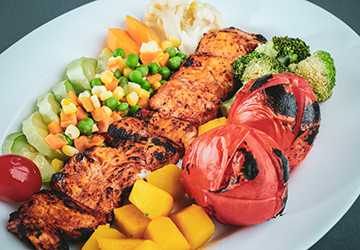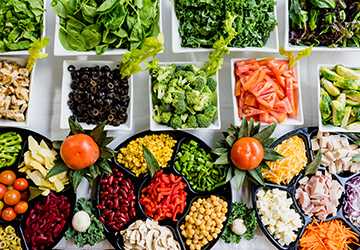Sports nutrition transcends mere eating; it's an intricate balance of diet, performance, and recovery. Understanding the basics of sports nutrition diet is beneficial and essential for athletes who aim to maximize their physical capabilities. This specialized diet is about more than just the food consumed; it's a comprehensive approach to nourishing the body, tailored to the unique demands of athletic training and performance.
The Role of Carbohydrates
Carbohydrates are the cornerstone of an athlete's energy supply, particularly critical in endurance sports or high-intensity training. They are stored in the muscles and liver as glycogen, the primary fuel used during exercise. Including various carbohydrate sources like whole grains, fruits, and vegetables ensures a steady energy supply and provides essential nutrients and fibre. After strenuous activity, carbohydrates are crucial to replenishing depleted glycogen stores, making them just as important post-exercise as before and during.

Importance of Proteins
Proteins are the building blocks of muscle repair and growth. For athletes, adequate protein intake is non-negotiable. It's not just about quantity; protein quality is equally vital. A mix of animal and plant-based sources can provide a full range of essential amino acids. This variety can come from lean meats, fish, dairy, and plant-based options like beans, lentils, and tofu. Timing of protein intake also plays a role, with post-exercise being a critical window for protein consumption to aid in muscle recovery.
Healthy Fats in an Athlete's Diet
Healthy fats, often underrated in sports nutrition diets, serve as a dense energy source and are pivotal for absorbing fat-soluble vitamins. They also play a role in inflammation reduction and overall heart health. Sources like avocados, nuts, seeds, and fatty fish provide these essential fats and add variety and flavour to an athlete's diet. Balancing different types of fats, especially omega-3 and omega-6, is necessary for optimal health.
Hydration: A Key Element
Hydration goes beyond just quenching thirst; it's critical for peak athletic performance. Even minor dehydration can impair performance and cognitive function. Athletes must focus on consistent hydration strategies and drinking fluids before, during, and after exercise. In situations involving prolonged activities or high sweat loss, sports drinks with electrolytes can be beneficial to replenish lost minerals and maintain fluid balance.
Micronutrients: Vitamins and Minerals
While macronutrients get the most attention in sports nutrition, vitamins and minerals are the unsung heroes. They play numerous roles, from energy production and muscle contraction to bone health and immune function. Athletes need to ensure a sufficient intake of essential micronutrients like iron, calcium, vitamin D, and various B vitamins, which are crucial for endurance, strength, and overall health. This is best achieved through a diverse diet of fruits, vegetables, lean meats, and whole grains.
Advanced Nutritional Strategies for Athletes
Athletes' dietary needs are as diverse as the sports they play. Going beyond the basics, advanced nutritional strategies involve a more intricate understanding of the body's requirements during different training and competition phases. This requires a personalized approach, considering factors like the type of sport, training intensity, duration, and individual metabolic responses.
Carbohydrate Loading
Carbohydrate loading is a strategy used by endurance athletes to maximize the storage of glycogen in muscles. This involves altering training and carbohydrate intake in the days leading up to an event. The aim is to ensure that muscle glycogen stores are at their peak, which can significantly enhance endurance and delay the onset of fatigue.
Protein Timing and Distribution
Recent research in sports nutrition emphasizes the amount of protein intake and the timing and distribution throughout the day. Consuming protein in evenly distributed amounts at each meal can be more effective for muscle protein synthesis than skewing intake toward one meal. This approach ensures a constant supply of amino acids, aiding optimal muscle repair and growth.

Functional Foods and Superfoods
Functional foods and superfoods can offer additional benefits beyond essential nutritional value. These include foods like berries, which are high in antioxidants; beetroot, known for enhancing blood flow and improving endurance; and turmeric, which has anti-inflammatory properties. Incorporating these foods into an athlete's diet can provide an edge in recovery and overall health.
Individualized Hydration Plans
Hydration needs vary significantly among athletes, influenced by sweat rate, climate, and exercise intensity. Developing individualized hydration plans involves assessing these factors and tailoring fluid intake accordingly. This can include water and sports drinks, which are essential in longer-duration activities to replace electrolytes lost through sweat.
Post-Exercise Carbohydrates and Proteins
Immediately following exercise, the body is in a state where it can rapidly replenish glycogen stores and initiate muscle repair. Combining carbohydrates and proteins consumed within a short window post-exercise can significantly enhance this recovery process.
Anti-Inflammatory Foods
Incorporating anti-inflammatory foods into post-exercise meals can aid in reducing muscle soreness and speeding up recovery. Foods rich in omega-3 fatty acids, like salmon and chia seeds, and colourful fruits and vegetables rich in antioxidants can be beneficial.
The Role of Supplements in Sports Nutrition
While a well-balanced diet should always be the foundation of an athlete's nutrition plan, supplements can play a role in achieving specific nutritional goals.
Ergogenic Aids
Ergogenic aids are substances used to enhance physical performance. These include creatine, which can improve strength and power; caffeine, which is known for enhancing endurance and focus; and beta-alanine, which can help buffer acid in muscles during high-intensity activity.
Conclusion: A Balanced Approach
In conclusion, a successful sports nutrition diet hinges on a balanced and individualized approach. It's not just about selecting the right foods but also about the timing and proportion of these nutrients. Athletes must listen to their bodies and adapt their diets to their training and recovery needs. By focusing on a comprehensive, varied diet and staying hydrated, athletes can significantly boost their performance.


